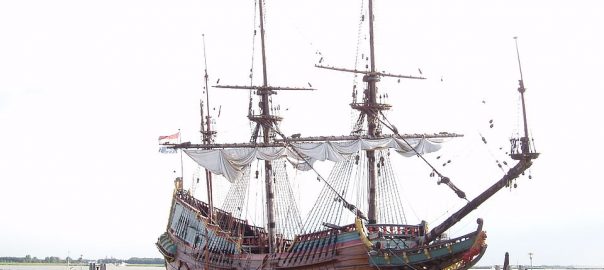This short explainer was written by guest contributor David Watson.
Around the turn of the 17th century CE two chartered companies were created, that while they seemed relatively unimportant at the time, would over the following decades become world changers. They were the English East India Company (1600) and the Dutch East India Company (VOC) in 1602.
These were not the first chartered companies engaged in long-distance armed trading expedition. We have already seen that England had created the Moscovy company in 1555 England also created the Turkey company in 1583. But those were smaller in mandate, and less eventually successful. Perhaps because it was to arrange trade with other European powers?
Portugal’s long-existing “Estada da India”, which had many trading nodes around the Indian Ocean, had a similar purpose, but it was still a directly government-run activity rather than a private company.
What is a chartered company? A good definition can be found at Oxford Reference as follows:
A form of trading company that developed from the European medieval trading guilds and was prominent in the late 16th and 17th centuries. The discovery by explorers of India and America stimulated individual merchants into forming groups, safeguarded by royal charter in order to monopolize trade. Governments awarded exclusive trading rights in a particular area to a few rich merchants. Such companies were easy to control and, with their specially granted diplomatic, legislative, and military authority, they acted as virtual representatives of the crown. Since the companies were so restrictive, they could arouse considerable domestic opposition.
It may not seem much, a European monarch or government allowing a group of wealthy citizens to buy the rights to be the only citizens of that country to trade for particular goods, in a particular location. But their mandate was actually much broader. They were sent to enter trade pacts, or treaties with local leaders, to be the only Europeans allowed to engage in such trade. Indeed, the first such treaty on behalf of the EIC, between England, and the Moghul emperor in 1617 includes a clause specifically excluding Portuguese trading in the region of the company factory at Surat.
The continuing naval confrontations between the various European powers, and especially the recent defeat of the Spanish Armada allowed these two companies to gain an advantage in East Asia.
The English and the Dutch were of course, also fierce competitors, but for a long while, it was mostly a stand off, with the Dutch having the main share of the spice trade, and the English outcompeting in other goods from India.
It is an interesting question whether religion played a role in deciding the eventual winners. The English and Dutch were Protestant countries, while Portugal and Spain were Catholic. There were obvious rivalries within Europe at the time, and a strong Protestant movement in the Netherlands was a factor in the independence movement there. Perhaps just a matter of the underdogs/newcomers being more motivated?
The success of these two companies resulted in a flurry of other such endeavours over the next century, including nearly 70 from France, and also formations from Sweden and Denmark. England alone created a company for nearly every area of the globe. All these companies did not have exactly the same mandate and goal. Basically, companies formed to deal in Asia and Africa were created primarily for trade. Companies primarily operating in the Americas had colonies for their purpose, such as the Dutch West Indies company, and the Plymouth company of England. The Hudsons Bay Company, formed over 150 years later was an exception, formed for trade. Nonetheless, in its heyday, it was the recognized owner of nearly half of the landmass of what is now known as Canada.
Though the Asian enterprises were primarily for trade, we will see that over the decades this transformed into de facto control of the areas of operation. In a nutshell, trade pacts were established, the company had a private army for security, and if there was local opposition, the home country sent in the military to help “protect” the trade rights from those they were to be trading with. The home country military defeats the local leader, appoints a puppet, and thus controls the area. Alternatively, in many cases, the company had at its command very capable fighting forces that could impose the company’s will without governmental help.
We should ask how they could become so successful. Suffice to say, that the European system of commerce allowed the formation of such companies, and the ambitions of a small group of countries with advanced military power used that vehicle to gain control over much of the globe. Oxford Bibliographies describes that system of commerce as:
The close relationships between the companies and the states that granted their charters reflected prevailing intellectual notions in the period from the 16th through 18th centuries about the nature of economic activity and state power. In essence, these postulated that global wealth and resources were finite and that the power of states depended upon their ability to control as much of the world’s trade and resources as possible. These ideas are summarized by the term “mercantilism” and company charters created in this period were frequently intended to help state acquisition and control over trade and resources at the expense of rival powers.
Mercantilism was most definitely a winner take all ideology, based on commerce. Rather than a colony, where they take over the land, these companies co-opted the whole economy, and thus took over control of the government.
